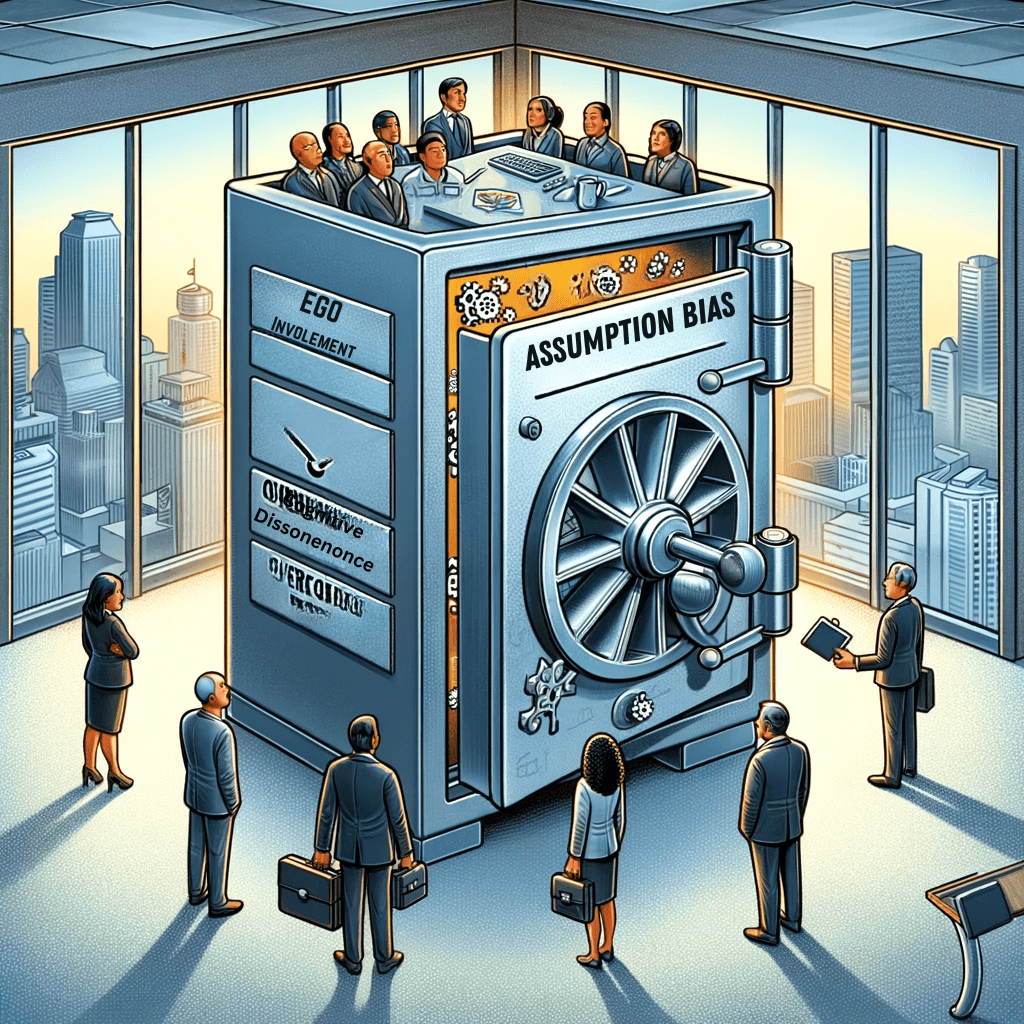Assumption Bias restricts the possibility of change for both the leader and followers. It acts like a steel safe, locking in a static belief system and locking out the possible alternatives.
The greater the power leaders have, the more vulnerable they are to assumption bias because their coworkers are unlikely to challenge them.
Here are three forms of assumption bias:
- Cognitive dissonance–When you have two conflicting beliefs and to reduce the internal tension/conflict you alter one belief. The stronger the conflict, the greater the rationality employed.
- Ego involvement–When you’re so invested in a position (in part because of group membership & your own emotional commitment) that you’re unlikely to be rethink or revise it.
- Overconfidence effect–When your subjective confidence in your judgments is reliably greater than your objective accuracy.
Assumption Bias at Work
A value-added reseller of a software company grew and prospered until one point it began to lose money each month. This surprised the senior team because their revenues had continued to grow with greater and greater software sales. Each time they sold software, they also sold maintenance and professional services. The company was locking into an assumption bias that began the day they open their doors: they sell software. Because this company saw itself as a software reseller and not a professional services firm, they managed the business around a software sales matrix and not the key performance indicators of a professional service firm.
Eliminating Assumption Bias
CO2 Coaching worked with this company to improve its performance, but first we had to expose and eliminate longstanding assumption bias. While the full nature of their business seems obvious now, it wasn’t at the time for the senior team, who had invested a lot of time, work, and ego in getting the company off the ground. They had to revise their vision of themselves and their company.
When you are moving through the change process, you will usually run headfirst into assumption bias–whether you’re an outsider or an insider. You may think that good ideas should be accepted and implemented quickly and easily. And they should, but that’s not usually how the script plays out. People don’t always act the way we expect or hope they will. They make assumptions and hold onto them–even in the face of superior logic.
Uprooting faulty assumptions requires not only superior logic, but also an examination of the bias or biases that led to the assumption. Be aware of the types of assumption bias–cognitive dissonance, ego involvement, and the overconfidence effect. Use this knowledge to help persuade stakeholders to see the situation in a more objective light and always challenge your own assumptions.
In confronting assumption bias, leaders must navigate a challenging terrain, often hindered by their own beliefs and those of their team. This calls for a transformative approach, one that requires not just a change in strategy but also a shift in perspective. The case of the software company illustrates this perfectly. Their journey from a struggling software reseller to a thriving professional services firm was not just about altering strategies, but fundamentally rethinking their business identity and confronting deep-rooted biases.
This transformational journey is where the expertise of CO2 Coaching becomes invaluable. With a deep understanding of the nuances of leadership and change management, CO2 Coaching offers a unique perspective that can help leaders and organizations break free from the shackles of assumption bias. Whether it’s cognitive dissonance, ego involvement, or the overconfidence effect, CO2 Coaching’s tailored approach helps identify and tackle these biases head-on.
The Role of Executive Coaching in Making Assumption Bias Visible
The role of an executive coach in this process is pivotal. A coach acts as a mirror, reflecting back the hidden biases and assumptions that might be hindering progress. They provide a safe space for leaders to explore and challenge their own beliefs, and in doing so, open up new avenues for growth and innovation. The objective perspective and experienced insight a CO2 coach brings can be the key to unlocking the true potential of a leader and their organization.
For leaders looking to navigate the complexities of change and challenge their own assumption biases, the path forward is clear. Engaging with a CO2 coach can provide the guidance and support needed to make transformative changes. By working with our coaches, leaders can develop a deeper understanding of themselves and their organizations, leading to more effective decision-making and a stronger, more resilient business.
If you’re ready to explore how CO2 Coaching can support you in overcoming assumption bias and driving meaningful change in your organization, we invite you to schedule a meeting with our managing partner. Together, we can unlock the potential for growth and success, fostering a culture of continuous improvement and innovation. Let’s embark on this journey of transformation together.




